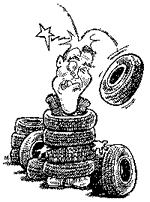| |
 Jim Grant's Tech Tips
Jim Grant's Tech Tips
94
Chevy P/U, Fuel Filter Problems & Fires
Q: It seems there was
a recall on fuel filter problems on '94 Chevy P/Us. I had already replaced
my fuel filter 2 times. Well, now I'm having problems again even after
Chevrolet supposedly "fixed" the filter recall. My truck will
run fine, then it will quit while I'm driving, causing me to shift into
neutral while coasting to restart it. I know it's not the fuel pump because
I checked that and I also checked the ignition and that was o.k. So I
figured there was a clogged fuel line from the filter to the carb. I sprayed
it with carb cleaner and tried to start it but it stalled out as soon
as it started. It then caught on fire right inside the carburetor. Now
I'm apprehensive about continuing with my home repair but I can't afford
to bring it to a shop. Please help before I have to dip into my savings
account. Any tips would be appreciated! Thanks
A: Diagnosis
by fire? It's a sure fire way to cure a driveability problem! How do you
know it isn't the fuel pump? Was fuel pressure checked with a pressure
gauge? Did you know that your truck doesn't have a carburetor? It's fuel
injected. It takes more than the presence of fuel for the fuel injection
system to operate properly. Your truck, if equipped with a low pressure
injection system, requires a fuel pressure of 9 to 13 psi. A fuel pump
providing anything less will cause the engine to exhibit many of the driveability
complaints that you mention. GM did issue a bullet pertaining to a hard
starting or no start condition. ALLDATA Information Systems shows bulletin
No. 66-63-09 that addresses owner's complaint that the engine is hard
to start or will not start. Cause; Low or no fuel pressure due to a ruptured
fuel pump pulsator. The pulsator is a flexible connector between the fuel
pump and the metal fuel line in the gas tank. Fuel pump pulsator's can
fail with age but are also sensitive to ethanol and additives such as
dry gas. The replacement pulsator is made with Viton which is more resistant
to gas additives. A closer inspection of your fuel supply system may provide
the answer to your problem.
|
|



